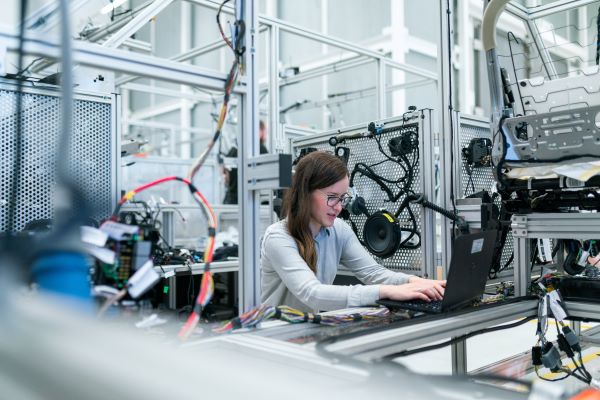
Supply Chain to Software: Unraveling the Broad Spectrum of Cybersecurity Careers in Renewables
21 Sept, 20235
Contents
- Understanding the Importance of Cybersecurity in Renewable Energy
- The Role of Cybersecurity in Renewable Energy
- Why Cybersecurity is Crucial in the Renewable Sector
- Exploring the Various Cybersecurity Careers in Renewables
- Cybersecurity Roles in the Supply Chain
- Software-related Cybersecurity Jobs in Renewables
- Skills and Qualifications for Cybersecurity Careers in Renewables
- Essential Skills for Cybersecurity Professionals
- Required Qualifications for Cybersecurity Roles
- Future Trends in Cybersecurity for Renewable Energy
- Emerging Cybersecurity Threats in the Renewable Sector
- Innovations in Cybersecurity for Renewables
- Navigating the Job Market for Cybersecurity Careers in Renewables
- Job Opportunities in Renewable Energy Cybersecurity
- Tips for Landing a Cybersecurity Job in the Renewable Sector
The rapid growth of renewable energy has brought numerous benefits, such as reduced carbon emissions and increased energy independence. However, with this expansion comes the need for robust cybersecurity measures to protect critical infrastructure and valuable data. In this article, we will explore the diverse range of cybersecurity careers in the renewables sector, the significance of cybersecurity in renewable energy, the required skills and qualifications, future trends, and tips for navigating the job market.
Understanding the Importance of Cybersecurity in Renewable Energy
As the renewable energy industry becomes increasingly interconnected through digital technologies and the Internet of Things (IoT), the risk of cyber threats also grows. The role of cybersecurity in renewable energy is multifaceted, encompassing the protection of power plants, smart grids, and energy storage systems. By ensuring the integrity, availability, and confidentiality of renewable energy infrastructure, cybersecurity safeguards against disruptions that can have severe consequences on both the energy supply and national security.
In today's world, where technology plays a vital role in our daily lives, it is essential to understand the significance of cybersecurity in the renewable energy sector. The rapid advancements in digital technologies have revolutionized the way we generate and distribute energy. However, these advancements also bring about new challenges and vulnerabilities that need to be addressed.
The Role of Cybersecurity in Renewable Energy
Cybersecurity plays a crucial role in the renewable sector by identifying and mitigating vulnerabilities in energy systems. It involves implementing preventive measures, such as access controls and encryption, to safeguard against unauthorized access and data breaches. Additionally, cybersecurity professionals constantly monitor and identify potential threats, implementing incident response strategies to minimize the impact of attacks and quickly restore normal operations.
One of the primary responsibilities of cybersecurity professionals in the renewable energy industry is to assess and analyze potential risks. They conduct comprehensive risk assessments to identify vulnerabilities in power plants, smart grids, and energy storage systems. By understanding these vulnerabilities, they can develop and implement robust security measures to protect critical infrastructure.
Moreover, cybersecurity professionals work closely with engineers and technicians to ensure that security measures are integrated into the design and implementation of renewable energy systems. This proactive approach helps in preventing cyber threats from exploiting any weaknesses in the infrastructure.
Why Cybersecurity is Crucial in the Renewable Sector
With the increase in automated processes and remote monitoring in the renewable energy industry, cyber threats have the potential to cause significant harm. A successful cyber-attack could disrupt energy generation, compromise grid stability, and even lead to safety concerns. Moreover, the renewable sector relies heavily on data collection and analysis, making it an attractive target for hackers aiming to manipulate, steal, or sabotage valuable information.
Imagine a scenario where a cyber-attack targets a renewable energy power plant. The consequences could be catastrophic, not only in terms of financial losses but also in terms of the impact on the environment and public safety. A compromised power plant could lead to a complete shutdown of energy generation, resulting in blackouts and disruptions in the energy supply. This, in turn, could have severe consequences for industries, businesses, and households that rely on a stable and uninterrupted power supply.
Cybersecurity in the renewable sector is not just about protecting physical infrastructure; it is also about safeguarding the data and information that drives decision-making and operational efficiency. Renewable energy systems generate vast amounts of data, ranging from real-time energy production data to customer information. This data is crucial for optimizing energy generation, improving grid stability, and enabling effective energy management. Therefore, protecting this data from cyber threats is of utmost importance.
Cybersecurity is a critical aspect of the renewable energy industry. It is essential to recognize the potential risks and vulnerabilities associated with the increasing interconnectivity and digitalization of renewable energy systems. By prioritizing cybersecurity and implementing robust measures, we can ensure the integrity, availability, and confidentiality of renewable energy infrastructure, safeguarding our energy supply and national security.
Exploring the Various Cybersecurity Careers in Renewables
Cybersecurity careers in renewable energy are diverse, ranging from roles within the supply chain to software-related positions. These careers focus on protecting vital infrastructure, developing secure software solutions, and ensuring compliance with industry regulations.
The renewable energy industry is rapidly expanding, with a growing number of companies and organizations investing in sustainable technologies. As the industry continues to evolve, the need for robust cybersecurity measures becomes increasingly important. Cyber threats can disrupt operations, compromise sensitive data, and even pose risks to public safety. Therefore, professionals in cybersecurity play a crucial role in safeguarding renewable energy systems.
Cybersecurity Roles in the Supply Chain
Within the renewable energy supply chain, cybersecurity professionals play a critical role in securing the procurement and distribution of components and systems. This involves assessing the cybersecurity risks associated with suppliers, conducting audits, and implementing protective measures to prevent unauthorized access or tampering during production, transportation, and installation.
For example, when procuring solar panels, cybersecurity experts evaluate the manufacturing processes to ensure that the panels are free from vulnerabilities that could be exploited by malicious actors. They also work closely with suppliers to establish secure communication channels and implement encryption protocols to protect sensitive information exchanged during the procurement process.
During transportation, cybersecurity professionals oversee the implementation of secure logistics practices, such as tamper-evident packaging and real-time tracking systems. These measures help prevent theft, tampering, or unauthorized access to renewable energy components while in transit.
Software-related Cybersecurity Jobs in Renewables
Software plays an essential role in renewable energy systems, from monitoring and control applications to data analytics platforms. Cybersecurity professionals in this domain focus on developing secure software solutions, conducting code reviews, and implementing vulnerability scanning to identify and address any weaknesses in the software architecture.
One of the key responsibilities of software-related cybersecurity jobs in renewables is to ensure that the software used in renewable energy systems is resistant to cyber attacks. This involves conducting thorough penetration testing to identify potential vulnerabilities and implementing robust security measures to mitigate the risks.
Additionally, cybersecurity professionals collaborate with software developers to integrate security features into the software development life cycle. This includes incorporating secure coding practices, such as input validation and output encoding, to prevent common vulnerabilities like cross-site scripting (XSS) and SQL injection.
Furthermore, cybersecurity experts in the renewable energy sector continuously monitor emerging threats and stay updated with the latest security technologies and best practices. They actively participate in industry conferences, engage in knowledge sharing forums, and collaborate with other cybersecurity professionals to enhance the overall security posture of renewable energy systems.
Skills and Qualifications for Cybersecurity Careers in Renewables
Successful cybersecurity professionals in the renewable energy industry possess a combination of technical skills, industry knowledge, and certifications. These skills are vital for designing and implementing effective cybersecurity measures to protect critical infrastructure.
As the renewable energy sector continues to grow rapidly, the need for robust cybersecurity measures becomes increasingly important. Cybersecurity professionals play a crucial role in safeguarding renewable energy systems from cyber threats, ensuring the reliable and secure operation of these vital infrastructures.
Essential Skills for Cybersecurity Professionals
Technical expertise forms the foundation of a successful cybersecurity career in renewables. Proficiency in network security, encryption technologies, risk assessment, and incident response is crucial. Cybersecurity professionals must have a deep understanding of the latest threats and vulnerabilities that can impact renewable energy systems.
Moreover, they must possess the ability to analyze complex systems and identify potential security weaknesses. This requires strong analytical and problem-solving skills, enabling them to develop innovative solutions to protect against cyber attacks.
Effective communication is another essential skill for cybersecurity professionals in renewables. They must be able to articulate complex security concepts to various stakeholders, including engineers, executives, and policymakers. This communication ensures that everyone involved understands the importance of cybersecurity and can collaborate effectively to implement necessary measures.
Required Qualifications for Cybersecurity Roles
In addition to technical skills, cybersecurity professionals in the renewable sector often hold certifications such as Certified Information Systems Security Professional (CISSP), Certified Ethical Hacker (CEH), or Certified Information Security Manager (CISM). These certifications validate knowledge and expertise in various areas, including risk management, secure software development, and infrastructure protection.
Obtaining these certifications demonstrates a commitment to continuous learning and professional development. It also provides employers with confidence in the candidate's abilities to handle the unique challenges of cybersecurity in the renewable energy industry.
Furthermore, industry-specific knowledge is highly valued in cybersecurity roles within the renewables sector. Understanding the intricacies of renewable energy systems, including solar, wind, and hydroelectric power, allows cybersecurity professionals to tailor their strategies and defenses to the specific needs and vulnerabilities of these systems.
Overall, a successful career in cybersecurity within the renewable energy industry requires a combination of technical skills, industry knowledge, and relevant certifications. By continuously staying updated with the latest threats and technologies, cybersecurity professionals can effectively protect critical infrastructure and contribute to the growth and sustainability of the renewable energy sector.
Future Trends in Cybersecurity for Renewable Energy
As technology continues to advance, the renewable energy sector will face new and emerging cybersecurity threats. Understanding these trends can help organizations proactively address potential vulnerabilities and stay ahead of attackers.
In addition to the existing cybersecurity challenges faced by the renewable energy sector, there are several emerging trends that will shape the future of cybersecurity in this industry. These trends include increased connectivity of decentralized energy systems, such as microgrids and peer-to-peer energy sharing platforms.
Decentralized energy systems offer numerous benefits, including enhanced energy efficiency and resiliency. However, they also introduce potential vulnerabilities that require innovative cybersecurity solutions to protect against unauthorized access and data manipulation.
One of the key challenges in securing decentralized energy systems is ensuring the integrity and confidentiality of data transmitted between various components. As these systems become more interconnected, the risk of cyberattacks targeting critical infrastructure increases. Organizations must implement robust security measures to safeguard against these threats.
Emerging Cybersecurity Threats in the Renewable Sector
One upcoming trend is the increased connectivity of decentralized energy systems, such as microgrids and peer-to-peer energy sharing platforms. While enhancing energy efficiency and resiliency, these systems also introduce potential vulnerabilities, requiring innovative cybersecurity solutions to protect against unauthorized access and data manipulation.
Another emerging cybersecurity threat in the renewable sector is the growing reliance on cloud-based services and Internet of Things (IoT) devices. Cloud-based services offer significant benefits, such as scalability and cost-effectiveness. However, they also present new security challenges, including data breaches and unauthorized access to sensitive information.
IoT devices, which are increasingly being used in renewable energy systems, can also be vulnerable to cyberattacks. These devices, ranging from smart meters to solar panel monitoring systems, can be targeted by hackers to gain unauthorized access or disrupt energy generation and distribution.
Furthermore, as renewable energy systems become more interconnected with traditional power grids, they become potential targets for nation-state actors and cybercriminals. Attacks on critical infrastructure can have severe consequences, including power outages and disruption of essential services.
Innovations in Cybersecurity for Renewables
The future of cybersecurity in renewables lies in innovative technologies such as blockchain and artificial intelligence (AI). Blockchain, a decentralized and tamper-proof digital ledger, can enhance security by providing transparent and immutable records of energy transactions. This technology can help prevent unauthorized access and ensure the integrity of data in renewable energy systems.
AI, on the other hand, can play a crucial role in automating threat detection and response in the renewable energy sector. With the increasing complexity and volume of cyber threats, AI algorithms can analyze vast amounts of data in real-time to identify patterns and anomalies that indicate potential attacks. By minimizing the time between identifying an attack and implementing countermeasures, AI can significantly enhance the cybersecurity posture of renewable energy systems.
Moreover, AI can also be utilized to develop predictive models that anticipate future cyber threats and vulnerabilities. By analyzing historical data and identifying patterns, AI algorithms can help organizations proactively address potential vulnerabilities before they are exploited by attackers.
In conclusion, the future of cybersecurity in the renewable energy sector is marked by emerging trends and innovative technologies. Organizations must remain vigilant and proactive in addressing these challenges to ensure the security and resilience of renewable energy systems.
Navigating the Job Market for Cybersecurity Careers in Renewables
For those interested in pursuing a cybersecurity career in the renewable energy industry, understanding the job market and preparing accordingly can significantly increase the chances of success.
Job Opportunities in Renewable Energy Cybersecurity
The demand for cybersecurity professionals in the renewables sector is on the rise as organizations recognize the importance of protecting their infrastructure. Job opportunities vary across different sub-sectors, including renewable power generation, smart grid technologies, and energy storage. These positions can range from entry-level analyst roles to senior management positions, providing diverse career pathways for individuals with a passion for both renewable energy and cybersecurity.
Tips for Landing a Cybersecurity Job in the Renewable Sector
When pursuing a career in renewable energy cybersecurity, individuals should focus on gaining practical experience through internships, industry certifications, and hands-on projects. Networking with professionals in the field and staying updated on the latest cybersecurity trends in the renewable sector can also enhance job prospects. Additionally, emphasizing a passion for sustainability and an understanding of the specific cybersecurity challenges in the renewable energy industry during job interviews can leave a lasting impression on potential employers.
Conclusion
Cybersecurity is an integral part of the renewable energy sector, protecting critical infrastructure, data, and operations from cyber threats. Understanding the significance of cybersecurity, exploring the diverse range of careers, acquiring the necessary skills and qualifications, and keeping abreast of future trends are crucial for professionals aiming to excel in this expanding field.
If you're eager to make your mark in this vital sector, we can help you find your perfect role. With the right knowledge, expertise, and job market preparation, individuals can contribute to the growth and security of renewable energy, simultaneously protecting the environment and powering a sustainable future. Contact us today, and let us assist you in finding your ideal career path within the renewable energy cybersecurity landscape."


